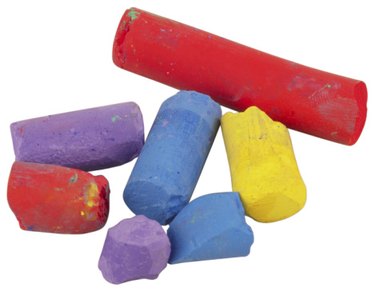Things You'll Need
Wax pastels
Water
Brush
Blending stick

Using wax pastels comes naturally to most art students because the application for these colorful little sticks closely resembles that of many other drawing tools. Many artists have used crayons since preschool, which makes them ready for a step up in quality with the wax pastel. Like average crayons, these pastels use wax as a binder for pigment. Most wax pastels differ from basic crayons in ease of application, color intensity and overall quality. Many wax pastels may be blended with a small amount of water for a painterly application.
Step 1
Use the edge of the pastel's tip to create lines when using wax pastels for linear art. Since the tip of these soft pastels may dull, apply a small amount of pigment to the page, and use a blending stick to achieve fine lines.
Video of the Day
Step 2
Cross-hatch, or form rapidly-drawn grids of lines, to add texture to areas of shadow with the wax pastel.
Step 3
Use the soft nature of this medium to your advantage when making large fields of color. Simply rub the tip of the pastel over your paper, leaving no white space, for intense and vibrant color.
Step 4
Blend wax pastels with each other by applying one color to the page first. Go back over the first color with a second, blending the two with the tip of the second pastel or a blending stick. It often works best to start with the darkest color when blending wax pastel colors.
Step 5
Use a wet paint brush to turn water-soluble wax pastels to a liquid medium. Simply apply color to the page as desired with the pastel, and use the brush to spread, smooth and blend the pigment.
Tip
Remember that pastels pick up small amounts of color from the paper when blending two or more hues. Simply rub the end of the pastel on a blank scrap of paper to remove other colors from each stick.
Warning
Do not drip or pour water onto the page when using water-soluble wax pastels because this will damage your paper.
Video of the Day